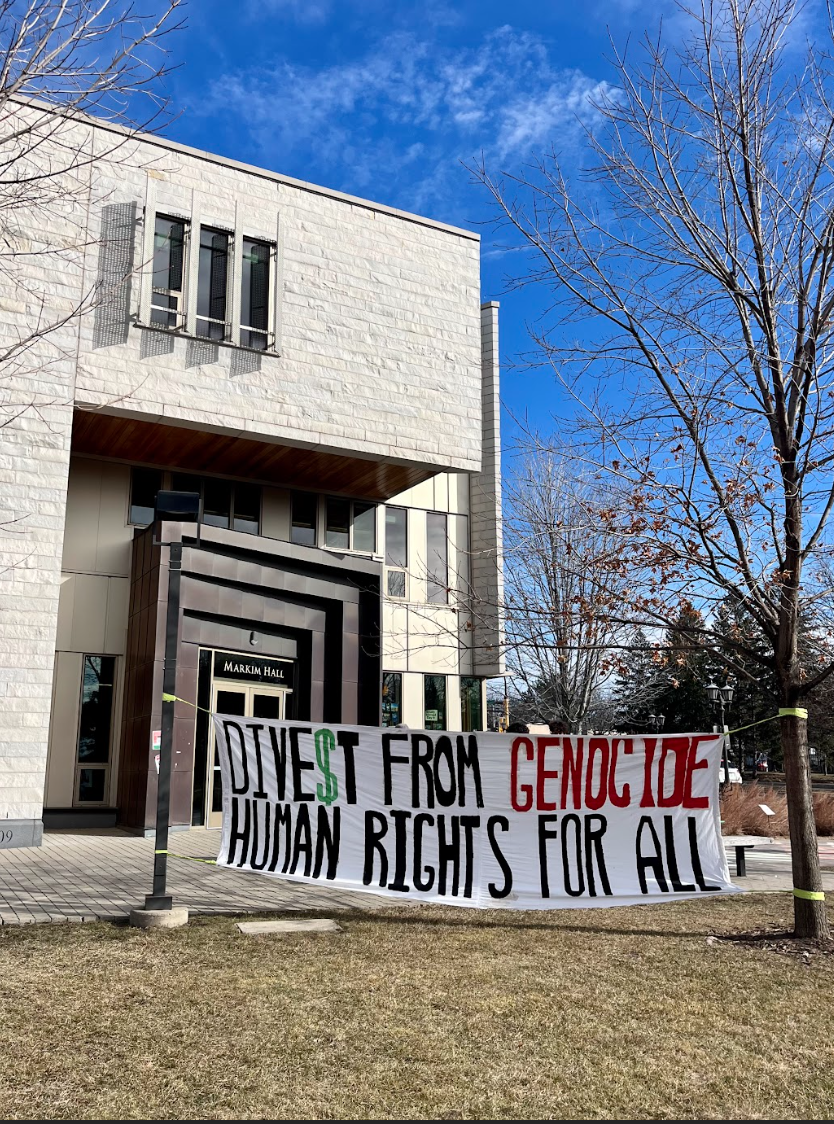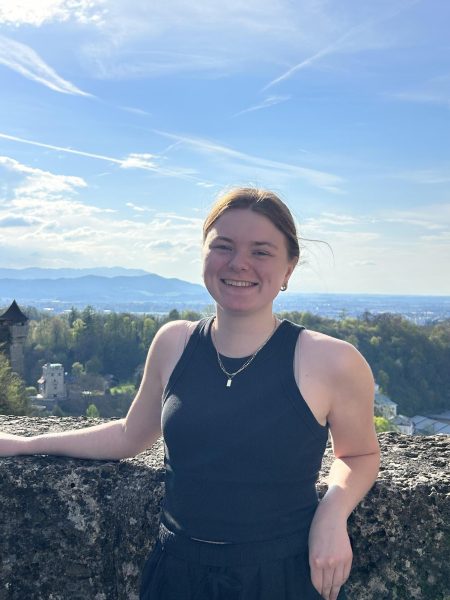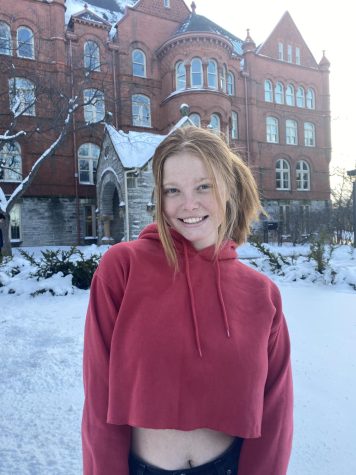Editor’s note: A previous version of this story stated that the Faculty Advisory Council nominated faculty to serve on the SRC. Faculty and students were chosen by the President to serve on the committee.
On Monday, April 15, President Suzanne Rivera announced that she is reforming the Social Responsibility Committee (SRC) to consider two proposals submitted by Mac for Palestine: one proposal to end Macalester-approved study away programs to Israel and another to divest from companies who financially support Israel.
If, after SRC consideration, Rivera agrees with their findings, she will present the SRC’s recommendations to the Board of Trustees (BoT) as per the BoT-approved Guidelines for Investor Responsibility approved in 2018.
The SRC is an ad hoc committee. It is only formed when the president requests it. According to Macalester’s website, the SRC’s purpose is to “provide advice to the College’s administration regarding practices and policies on issues with significant implications for responsible institutional behavior.”
Most recently, the SRC was formed to consider proposals from Fossil Free Mac starting in 2015. It took multiple tries for the SRC to approve and for the BoT to divest from the Enbridge pipeline in 2021. According to Roopali Phadke, professor of environmental studies who served as chair of the SRC in 2021, the committee’s decision process took several months.
The SRC consists of 15 members, composed of staff, faculty, alumni and students. The Staff Advisory Council (SAC) nominated staff to serve on the committee. Likewise, the Alumni Board nominated alumni. Vice President of Student Affairs Kathryn Kay Coquemont worked with Rivera to choose students and faculty to serve on the committee.
The first proposal to end Macalester-approved study away programs in Israel began as a petition that circulated last semester. In November 2023, Rivera stated in a meeting with Macalester College Student Government (MCSG) that Macalester would not be removing these programs. In an email to The Mac Weekly, Rivera reemphasized that she did “not support removing any institutions from our list of approved student away programs for political reasons.”
When Mac for Palestine submitted a formal proposal to her this semester, she tasked the SRC with considering it.
The second proposal is part of Mac for Palestine’s BDS or Boycott, Divestment Sanctions committee, which has been working since last fall to research and write it. The proposal draws from the BDS Movement and calls for Macalester to divest from specific companies.
“By targeting specific companies that most directly facilitate and/ or profit off of Israel’s apartheid and war crimes, we concentrate our efforts and increase our impact,” the proposal explains.
From the BDS’s list, Mac for Palestine identified three known Macalester investments and directly asks for divestment from Charles Bank Equity Funds (VII, VIII, and IX), Noble Midstream Partners and KKR Asian Funds.
The next significant portion of their proposal expresses their desire for financial transparency and to make all of Macalester’s investments publicly accessible. Charlie Gee ’26, Alex Beaudreau ’26 and Eva Sturm ’26, three researchers and authors of the second proposal, said that they were only able to find 132 of the 680 individual investments in Macalester’s endowment.
Fossil Free at Mac’s 2021 proposal to divest from Enbridge called for transparency regarding investments from the BoT. Gee, Beaudreau and Sturm noted that this request had gone unfulfilled and repeated this ask in their proposal.
“We don’t need a presentation to a couple people — we just need the documents on the internet,” Gee said.
The second proposal on divestment makes a direct argument why companies that are helping facilitate Israel’s war crimes and apartheid qualify as a “grave social injury,” according to the BoT’s guidelines.
The guidelines define grave social injury as “the excessive or deliberate injurious impact on employees, consumers and/ or other individuals or groups resulting directly from action or inaction by an investment vehicle’s management.” Additionally, “social injury or environmental harm shall only in unusual circumstances include the act of doing business with other investment vehicles that are themselves engaged in social or environmentally injurious activities.”
Although the companies do not have “direct” involvement, Mac for Palestine laid out their reasoning as to why it should count as an “unusual circumstance.”
“Genocide is an unusual circumstance,” Beaudreau said. “Even if it is not direct, it qualifies as a great social injury to have any money supporting that.”
Mac For Palestine also highlighted how their calls for divestment are a part of a larger community advocating for divestment.
“A lot of other schools, or other groups similar to Mac for Palestine at other schools, have created divestment proposals that are specifically for the targets laid out by BDS,” Beaudreau said.
Mac for Palestine acknowledged that there are still many steps to go before the BoT would adopt either proposal.
“We hope this proposal goes through,” Sturm said. “We know it’s really hard and complicated, and that they want it to be. We hope people consider it and we hope that this is something that affects real change, and we think ending investment is deeply important for Palestinian liberation.”
The SRC had their first meeting on Monday, April 22. Rivera has asked the SRC to have a recommendation on the proposals by Saturday, July 1.













David Isenberg • May 1, 2024 at 8:26 am
In 2010 a mixed group of climate and Palestine student activists formed the Student Endowment Responsibility Committee, an all-student group designed to represent student interests in Macalester’s endowment. SRC didn’t exist at the time. Now that it does, SRC student representatives should be student-chosen, not by the Vice President of Student Affairs.
Theresa Dwyer • May 3, 2024 at 10:05 am
Agreed.